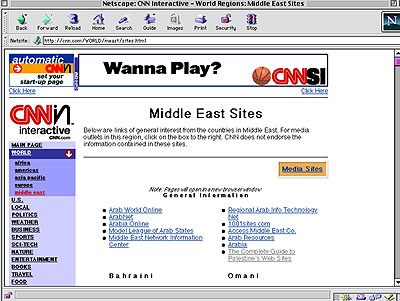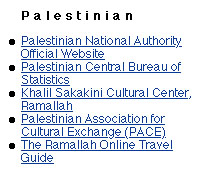
Still hiding away in Minnesota, I took some time once again to write a letter to CNN Interactive about part of their website, a letter I'd written perhaps 12 times over the last few years, and one I arranged a limited letter-writing campaign to a couple of years ago. The difference this time was that I got a positive response...
For those of you who are regular users of the excellent "Complete Guide to Palestine's Websites" maintained by Birzeit University at http://www.birzeit.edu/links/, you will be familliar with the text greeting visitors:
"In some ways the World Wide Web is like all other communications media.
There is more material available about Palestine originating from outside the country than from within it.
In fact, most of the information flow on the Internet travels from the North to the South, reflecting this bias.
In addition, Northern categorisation processes are flawed. A visitor to Yahoo!, for example, will be interested to see that the autonomous Palestinian area of Ramallah is listed as being part of Israel.
Similarly, American news organisation CNN does not even list a single Palestinian website based inside Palestine in its Middle East "related sites" section. Neither does it have any Palestinian category in this section.
Mabrook (congratulations) to the search engines Lycos and Excite, and ABC News, all of whom recognise that the West Bank and Gaza Strip are territories that are not automatically part of Israel.
The COMPLETE GUIDE TO PALESTINE'S WEBSITES offers Web surfers direct access to categorised reviews of all websites published by individuals and organisations located in Palestine. Get the news from those who live it!"
All true. And Lycos and Excite weren't always like that.
Finally, Yahoo! created a "Palestinian Authority" regional section, which although preferable to a listing under "Israel", carries with it its own set of problems. This was only after a series of pointed e-mails from webmaster@birzeit.edu were forwarded to Eric at Yahoo!, and I was able to start a dialogue.
So, while Palestine's Internet community was in a state of incredible growth, and those of us working on the ground were excited at the overwhelming and positive response from Web surfers around the world, the big news corporations and search indexes were buying into and propagating the same old reportoire of Israeli domination of the occupied territories or, in the case of CNN, promoting the "invisible Palestinian".

Perhaps the most offensive aspect of CNN's "Middle East Related Sites" page (left, showing the recently-altered page) was that the single link in the general section, that appeared to list a site with "Palestine" in the title, was to a Saudi Arabian-based commerical site.
Considering that CNN reports a lot of news about the Israeli-Palestinian conflict, it seemed the least they could do to fix this glaring imbalance.
For over two years, while I was working at Birzeit University as webmaster, I wrote regularly to CNN at its feedback address, asking them to fix the problem. Nothing happened. The automated responses kept coming back assuring me that mail was read.
Once, I even organised a letter writing campaign through the Complete Guide's mailing list, just to see if a whole pile of letters arriving at the same time would catch anyone's attention. It didn't.

A few days ago, I wrote again to CNN's feedback e-mail address, copying my message to Ali Abunimah in Chicago, whose media monitoring efforts recorded at http://www.abunimah.org/ are second to none. Ali wrote back giving me the private e-mail address of Scott Woelfel (pictured right), who heads CNN Interactive, in other words, CNN's website. I sent the following message:
Dear Mr. Woelfel,
Greetings and kudos on a well-maintained news website at cnn.com. I was given your e-mail address by Ali Abunimah, who recommended I contact you as he had experience of your responding to e-mail.
What has been most upsetting for me is that I have been writing to CNN with my concern below for a period of more than two years without any response other than automatic, or any visible change in CNN's policy.
I hope you will agree with me that this is a simple thing to fix that will be received very positively by CNN's readers in the Middle East, and those who closely follow this section of your website in North America and Europe.
Considering that a lot of your reportage on the Middle East is related to the Israeli-Palestinian conflict, it seems unforgivable that since your website was created, the Middle East Related Sites page at http://cnn.com/WORLD/meast/sites.html has **not even a single** Palestinian website or even a "Palestine" category.
It has been said that the Israeli-Palestinian conflict is the fifth most popular international news story in the world. That CNN ignores the local websites of one of the two sides is a glaring ommission. Even Yahoo, which used to list Palestinian sites under "Israel" added a "Palestinian Authority" area to its regional and country listings in 1997. It is imperative that CNN does the same, for reasons of balance.
The "Complete Guide to Palestine's Websites" at http://www.birzeit.edu/links/ maintained by the Palestinian "Harvard", Birzeit University currently lists 184 local websites maintained by organisations and individuals based in the West Bank.
I was invited in August 1997 to speak at the United Nations in Geneva on the development of the Palestinian Internet. If you would like, I would be happy to list ten or so of the 184 Palestinian sites that should be considered "essential" to include in a Palestine category in your "Middle East Related Links" page.
Thank you for your time,
Nigel Parry
Correspondent, Middle East International magazine
Author, "A Personal Diary of the Israeli-Palestinian Conflict" http://www.nigelparry.com/diary/
And, I was amazed, after trying to get this reasonable request answered for over two years without any joy, to actually get a response the following day:
Dear Mr. Parry,
Thank you for your note. I'm sorry that your others went unanswered.
I think your suggestion is a good one and I have asked our managing editor to look into adding a set of Palestinian links to the page.
Sincerely,
Scott Woelfel
Mr. Parry,
You should see a new set of Palestinian links on that page later tonight or tomorrow. I hope that once you do you will consider removing your criticism of CNN from your page at http://www.birzeit.edu/links/.
Sincerely,
Scott Woelfel
Although it isn't "my page" anymore, Birzeit's new webmaster will remove the criticism, as if there was one thing we always were, in our very vocal criticisms of the big media organisations' treatment of the Palestinians, was *fair*.

What was particularly heart-warming about the CNN change, pictured on the right and visible at http://cnn.com/WORLD/meast/sites.html, was that after the category "Palestinian" was added, the rest of the country listings changed from "Israel" to "Israeli", "Egypt" to "Egyptian", and so on. This was a measure of balance that I had not expected from CNN that went the extra mile.
A lot of the letters of concern and protest letters we write get deleted. The people maintaining big media sites and reading the e-mail I would guess are often technical people with little or no editorial control. They probably get a lot of crap sent to them. So they get deleted. What else can explain something like twenty or thirty letters - containing a very sensible suggestion - going missing over the period of two-and-a-half years?
As this was a case of crass and easy-to-demonstrate imbalance, I always believed that anyone with any seniority in CNN would deal with it immediately. The trick was how to get the message to them.
Now, thanks to Ali, in possession of the direct e-mail of the senior person responsible, Scott Woelfel, things moved fast.
It was exactly the same with Yahoo!, two years ago, which goes to show that a little bit of research before a protest letter - maybe a few telephone calls to the corporate office to get a contact name and e-mail address - goes a long way.